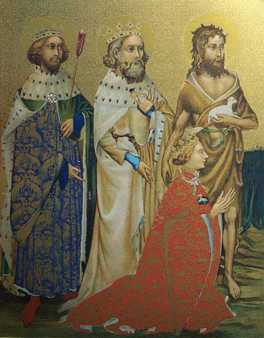A rebellion defused
They made their way to London, selectively executing local officials and releasing those imprisoned for tax evasion. But the violence of the rebels was limited, and their less than 200 victims were carefully chosen.
They were admitted to London by sympathizers, but looted and burned some buildings. When King Richard II (only 14 years old) met with the rebels, their great devotion to their sovereign was his only guarantee of safety against their overwhelming numbers*. Richard agreed to their demands* but on his second meeting with them the next day Wat Tyler was mortally wounded* by the mayor of London and chaos nearly ensued.
Richard courageously offered himself as leader to the rebels and led them away from the city. Of course, the government had no intention of keeping its promises. The rebellion did, however, bring to an end the poll tax and it contributed to the gradual replacement of serfdom by paid labour and tenancy contracts.
Footnotes
-
Thousands of angry peasants
And on the vigil of Corpus Christi Day the commons of Kent came to Blackheath, three leagues from London, to the number of fifty thousand, to wait for the king, and they displayed their banners of St. George and forty pennants. And the commons of Essex came on the other side of the water to the number of sixty thousand to aid them, and to have their answer from the king.
This and other quotations from the Anonimalle Chronicle, trans. C. Oman, are found in The Great Revolt of 1381 (Oxford: Clarendon Press, 1906). See The Portable Medieval Reader.
-
Tyler's demands
And when he [Richard] was come the commons all knelt down to him, saying 'Welcome our Lord King Richard, if it pleases you, and we will not have any other king but you. . . .' And they required that for the future no man should be in serfdom, nor make any manner of homage or suit to any lord, but should give a rent of 4d. [four pence] an acre for his land. They also asked that no one should serve any man except by his own good will, and on terms of regular covenant [contract].
Later, Tyler's claims reportedly became a little less realistic, perhaps not surprising for someone leading an army of thousands:
. . .and he asked that from henceforth there should be no outlawry in any process of law, . . . and that there should be equality among all people save the king, and that the goods of Holy Church should not remain in the hands of the religious, nor of parsons and vicars, and other churchmen; but that. . . [Church] goods should be divided among the people of the parish.
-
Mortally wounded
Tyler reportedly behaved in an insolent manner towards the king, then struck out at a man who accused him of being "the greatest thief and robber in all Kent." When the mayor tried to arrest Tyler for this unwarranted attack on his accuser, Tyler reacted violently and a short scuffle followed (but only the mayor was wearing armour).
